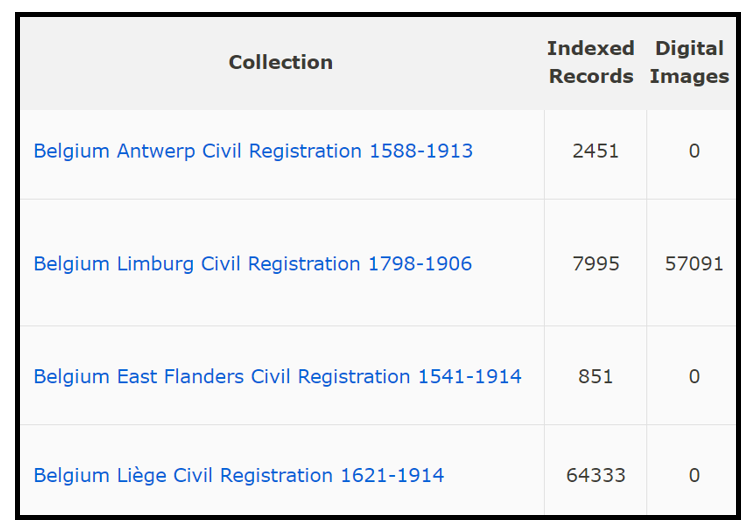by Lisa Cooke | Oct 14, 2016 | 01 What's New, Records & databases |
This week, we bring you new and updated record collections from genealogy societies around the world. We are often familiar with the record sets available at FamilySearch, Findmypast, and MyHeritage, but many more wonderful virtual repositories exist online. Check out these records for New Zealand, Belgium, Israel, Britain, and Ireland.
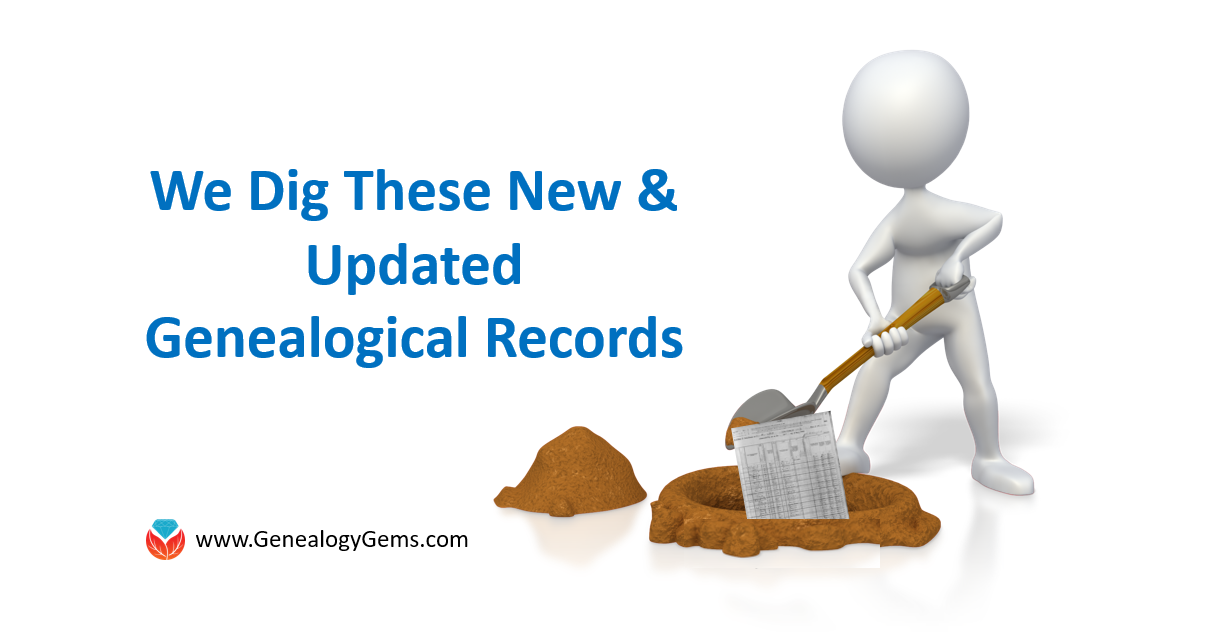
New Zealand – Civil Records
FamilySearch has added a large new collection this week for New Zealand.
New Zealand, Civil Records Indexes, 1800-1896 is an index only, but numbers 857,382 records. This index collection contains birth, marriage, and death records between the years of 1800 to 1896. The original records are located with the New Zealand Government, Internal Affairs.
Birth records may contain:
- First and last name of child
- Date of birth
- Location of birth
- First and last name of father and mother
Marriage records may contain:
- Date and location of wedding
- Bride’s first and last name
- Groom’s first and last name
Death records may contain:
- Date and location of death
- First and last name of deceased
- Date of birth
- Age at death
Belgium – Civil Registrations
Though FamilySearch has only added to these collections, it is a good idea to check back in to see what’s new. This week, four Belgium collections regarding civil registrations have been added to.
You will notice in the chart above, some of these record sets are indexed records only.
Belgium, Antwerp, Civil Registration, 1588-1913;
Belgium, East Flanders, Civil Registration, 1541-1914; and
Belgium, Liège, Civil Registration, 1621-1914 are the index only collections.
Belgium, Limburg, Civil Registration, 1798-1906 is the only one that contains digital images.
Each of these civil registration collections contain birth, marriage, and death records for the town locations and time periods listed. The records for Limburg are written in Dutch or Flemish depending on the timeframe. You will find names, dates of events, and sometimes details such as residence, marital status, and names of parents in any of these civil record sets.
Israel – Misc. Records
Societies around the world bring a wealth of information to our research. A Gem’s reader, Elena, shared with us this next record collection set for Israel. The
Israel Genealogy Research Association has over 730,000 records from over 260 databases on their website. You can search in English or Hebrew and for free, though you are required to register.
The IGRA adds or updates their record collections about every two months. In particular, record collections cover:
They also have miscellaneous records from various parts of the world, such as a list of Russian Jewish POW’s in World War I and a list of Jewish soldiers in the International Brigade that fought in the Spanish Civil War.
Britain – Registers
Findmypast has released the new Britain, Registers of Licences to pass beyond the seas 1573-1677 collection which records the details of early travelers who left Britain for Ireland, continental Europe, New England, Barbados, Bermuda and other overseas colonies.
The collection includes over 27,000 fully searchable transcripts and scanned images of original documents. It includes lists of soldiers who signed a statutory oath of allegiance before serving in the “Low Countries” between 1613 and 1633, licences for individuals traveling to Europe between 1573 and 1677, and registers of individuals traveling to America between 1634 and 1639.
The records showing passengers licensed to sail to the Americas are very rare, making this collection quite significant. They record groups headed for colonies in New England, Maryland, Virginia, Barbados, Bermuda, St Kitt’s, and the Providence Island colony during the 1630s. Very few original records from this early period of American history are available online. Registers record the details of some of earliest English settlers to arrive on the continent.
After 1609, all travelers over the age of 18 had to swear an oath of allegiance to the monarch before the Clerk of the Passes could issue them with a licence to leave the country. The dates shown in these records are the date the oath was taken or the date the licence was issued – not the date of actual departure.
Ireland – Indexes
Societies around the world continue to amaze us, as does The Irish Genealogical Research Society with three recent updates. These updated collections include new birth, marriage, and death confirmations of citizen of Ireland.
In particular, the birth index was most recently updated to reflect information gathered from several thousand records taken from Index of Nuns, a CD publication in 2015 by the Catholic Family History Society. which notes biographical information for about 14,000 nuns, many of them from Ireland.
Also, there are entries from a census-substitute dated 1887 recording the Roman Catholic residents of the parish of Kirkinriola, Co. Antrim and entries taken from Emigrants from Ireland, 1847-1852.
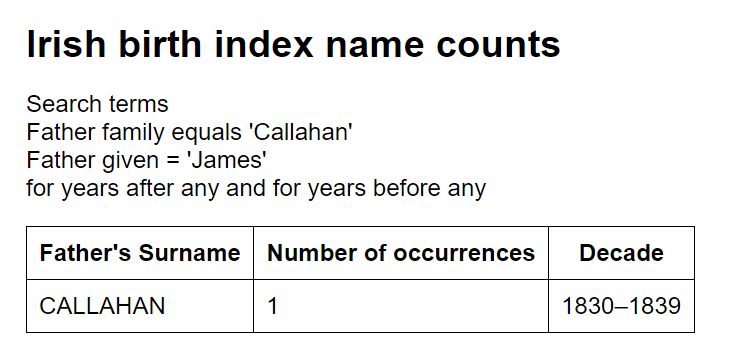
IGRS is another genealogy society around the world containing Irish records.
The full database is available only to Members. However, a restricted but free surname-only search of the database can be made by non-members. A search will tell you how many entries in the database match your search criteria. It will not provide all the details of those matched records. You can however become a member with all access by visiting their subscription page here.
Genealogy Societies Around the World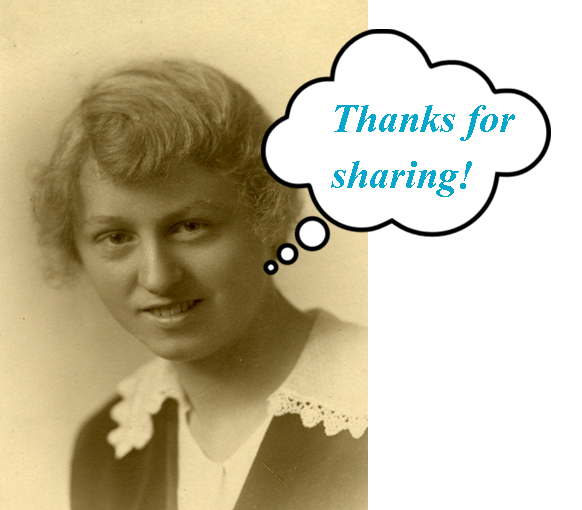
You may never have considered joining a genealogical society outside of your country, but may find it is just what you need to break through that brick wall. Do you know of a genealogy society that has an extensive collection of records? If you do, would you share it with us? We would love to hear about it in the comments below. Be sure to leave a link so that we can check it out!
by Lisa Cooke | Apr 29, 2019 | 01 What's New, Writing Family History |
Standing in judgement of our ancestors may be unavoidable. Genealogists dig up the good, the bad, and the ugly. We cannot pick and choose what we find, but we might be able to pick what and how we share it with others.

Recently, I received a letter from a Gem’s reader which included a very delicate and sensitive matter. She writes:
Hi Lisa!
I love your blog and podcast. Thank you for all you do getting gems together for us! I have a question for you and would love to know your opinion (or the opinion of anyone else as well!)
I was recently at a family wedding. I printed out all the family and ancestor’s paper trails and documents and was passing them around to my aunt, uncles, and cousins. My mom’s eldest brother brought up a memory he had of his grandfather, my great-grandfather, a German immigrant. My uncle whispered it to me because the saying my great-grandfather often said is very prejudice. I won’t tell you what the quote is but it’s prejudice against Jewish, Irish, and Dutch people. Here’s my question – should I write down that my great-grandfather was prejudice against certain people to preserve this part of his character or should I let this information fade into history? As genealogists we are always trying to get a full view of the person we are researching – past the census records, military service paperwork, and wills – and into the real person and personality. So, I now have a more broad view of my great-grandfather, but it’s negative. Should I preserve this character flaw in my ancestry notes? I’m conflicted about what to do. Maybe if this was a further distanced relative I would have an easier time brushing aside this prejudice but I’m having a hard time with the “right thing to do.” Any advice would be wonderful!
As a side note I will tell you that in the following generations this mans’ children and grandchildren have married Irish and Jewish spouses. Haha. I guess the “saying” was never echoed by his descendants!
Thanks,
Jennifer
Judgement of Our Ancestors
This is a great question and I applaud you for thoughtfully taking a moment to really think it through and ask for advice before moving forward on recording what you were told.
You asked – Should I write down that my great-grandfather was prejudice against certain people to preserve this part of his character or should I let this information fade into history? My opinion is, no. Mother Lisa says this is gossip and you didn’t hear it straight from your great-grandfather. I certainly wouldn’t want anyone else attributing a negative comment to me without having the chance to review or rebuke it. It’s a slippery slope.

Little Tea & Gossip by Robert Payton Reid, Source: http:⁄⁄www.liveinternet.ru⁄users⁄pmos_nmos⁄post357791815⁄
You also asked – Should I preserve this character flaw in my ancestry notes? And there’s the slippery slope. I believe that we, in modern times, should avoid sitting in judgement of ancestors who are not here to defend themselves. We don’t want to presume that we are in a position to decide how wrong “the crime” is. We certainly don’t want to be negatively prejudiced against others ourselves, but it is impossible to put oneself in another’s shoes in a differing time and circumstance. We know nothing about what the person really said. Perhaps they were joking (even though in extremely bad taste!) Maybe the person who heard this, and passed it on, had an ax to grind and part or none of it is true. Or, maybe there was an experience that our ancestor suffered that could have given him a reason to gripe based on his personal experience. You just don’t know.
In my book, I would chalk this up to gossip and either prove it with substantiated evidence or move on. What goes around comes around so let’s hope it will prevent an occurrence of someone gossiping about you and your future descendant spreading it into the ages.
Deciding to Write the Whole Story
In cases where you have secured substantial evidence that a negative story is true, you still have a choice to make. When I come across particularly sensitive or negative information about an ancestor, and before I make it public, I ask myself, “who will this help, and who will it hurt?” Does adding it to the family history enrich it? Is there anyone living today who might be hurt? If someone stands to be injured, but you’re set on capturing the story, I encourage you to do so privately for your own records and of course, cite all of your sources.
If you do decide to write and publish sensitive stories, I know that you will want to do so in as gentle and fair a way as possible. Here are some things to consider when writing about delicate stories of our ancestors:
- Be sure to cite your source – who told you the story and when. The reader can decide whether to take the story with a grain of salt or believe it.
- Let your readers know your reason for sharing the story in the first place. Genealogy Gems blogger Amie Tennant recently read a family history that included a horrible childhood memory. The writer stated it was important to put the family dynamics in full view so that other stories would be seen in the “right light.”
- If naming everyone in the story will cause hurt or embarrassment, consider documenting the essence of the story without naming names.
Whatever you decide, writing a family history, though difficult at times, can be a rewarding experience.
by Sunny | Mar 30, 2018 | 01 What's New, Records & databases
See if you can find U.S. ancestors using these new online resources (many of them free!): U.S. Supreme Court cases; an African American research guide; newspapers serving Illinois, Iowa, North Carolina and Texas; orphan train riders and Rhode Island burials since...
by Lisa Cooke | Sep 7, 2016 | 01 What's New, Book Club, British, Military, United States |
Research WWII ancestors with these three tips. The experiences of our ancestors during World War II add a rich texture to their personal history. Whether in the military, on the home-front, or those living in neighborhoods that became battle zones, find their stories with these helpful tips.
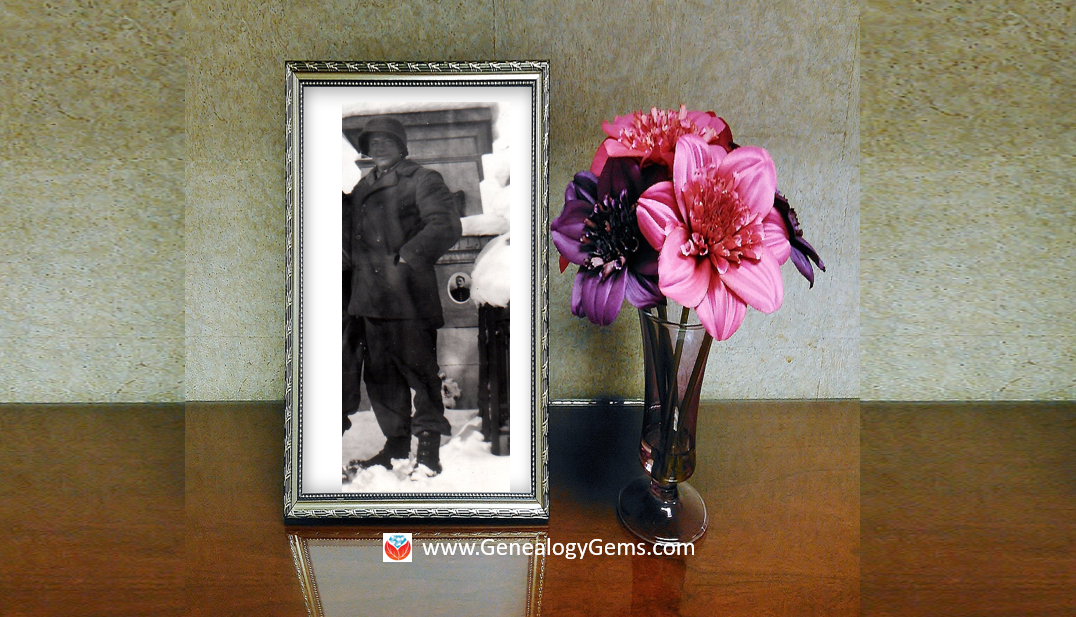
 In Everyone Brave is Forgiven by Chris Cleave, our current Genealogy Gems Book Club title, we read about different ways Londoners experienced World War II. A soldier shipped out to Malta, a female War Office recruit, a child evacuee, a civilian running regularly for underground shelters as bombs fell; these are just a few of the book’s poignant stories.
In Everyone Brave is Forgiven by Chris Cleave, our current Genealogy Gems Book Club title, we read about different ways Londoners experienced World War II. A soldier shipped out to Malta, a female War Office recruit, a child evacuee, a civilian running regularly for underground shelters as bombs fell; these are just a few of the book’s poignant stories.
That diversity of experience was part of our ancestors’ lives, too. Some served in the military and some kept the home fires burning. Some even dodged bombs or bullets in their own neighborhoods! Many experienced the horrors of concentration, POW, or other types of interment camps.
As many different experiences as they had, there are just as many ways to research their lives during WWII. Here are several scattered examples of the kinds of records and resources you may find. Do a little of your own exploring to see whether the kinds of materials below exist for your WWII ancestors.
Research WWII Ancestors: The Soldier

Research WWII Ancestors: On the Home Front and in Harm’s Way

Lisa’s grandmother heading off to work at Kaiser’s Richmond Shipyards, c. 1941
Millions of civilians’ lives were directly affected by the war. Many women entered jobs for the first time in their lives or began doing new types of volunteer work. Families faced rationing, price controls, and blackouts. Some unfortunates found themselves in the path of the war.
This article from the U.S. National Archives has an excellent review of the kinds of online and offline resources you can read to learn more about U.S. home front activities. Reading Everyone Brave is Forgiven will introduce you (in a re-imagined way) to the experience of Londoners caught in The Blitz. You can also explore The Blitz in this interactive map of the bombings.
Speaking of maps, one resource your home-front family would have used to follow troop movements and the progress of the war were the Stanley Turner maps. His collection contained a unique series of action-packed maps. These can add a fascinating and colorful layer of understanding to your family’s experience during this time.
Must-reads: The Genealogy Gems Book Club
 The Genealogy Gems Book Club is an exceptional virtual book club for everyone. Every quarter, we recommend a fiction or nonfiction title that has a compelling slant for family history lovers. Then, we interview the author and share the conversation with you. Right now, we’re talking about Everyone Brave is Forgiven by Chris Cleave, who joins us in a couple of weeks on the Genealogy Gems Premium Podcast (there’s an advance teaser in the free Genealogy Gems podcast episode 195.) Watch for these episodes and check out other titles we’ve recommended in The Genealogy Gems Book Club!
The Genealogy Gems Book Club is an exceptional virtual book club for everyone. Every quarter, we recommend a fiction or nonfiction title that has a compelling slant for family history lovers. Then, we interview the author and share the conversation with you. Right now, we’re talking about Everyone Brave is Forgiven by Chris Cleave, who joins us in a couple of weeks on the Genealogy Gems Premium Podcast (there’s an advance teaser in the free Genealogy Gems podcast episode 195.) Watch for these episodes and check out other titles we’ve recommended in The Genealogy Gems Book Club!

